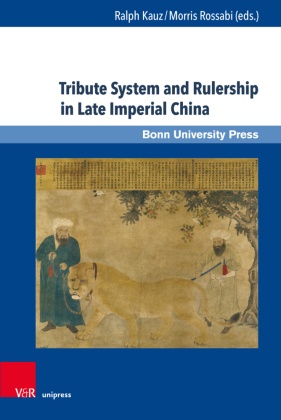Tribute System and Rulership in Late Imperial China
| Verlag | V&R unipress |
| Auflage | 2022 |
| Seiten | 366 |
| Format | 16,0 x 2,3 x 23,8 cm |
| Gewicht | 668 g |
| Artikeltyp | Englisches Buch |
| Reihe | Studien zu Macht und Herrschaft Band 009 |
| ISBN-10 | 3847114026 |
| EAN | 9783847114024 |
| Bestell-Nr | 84711402A |
The so-called tribute system was a complicated arrangement with a substantial history, and no single motivation offers a complete explanation of its implementation or lack thereof. Thus, the name 'tribute system' may be at all a misnomer for China's historical international relations.
Insights into the so-called 'Tribute System' in Late Imperial China
Demanding and offering tribute is a most common feature in human societies and nothing special to China. In the course of the development of Neolithic and later societies social classes have developed where persons who achieved superior positions first could demand 'presents' or tribute from neighboring societies they defeated and then, with the assistance of sturdy 'servants' from their own people. China was certainly no exception to that principle and one of the first terms for tax was thus 'gong', tribute. In China's early, 'feudatory' social system, tribute was demanded from lower political entities, and the mutual 'political' relations were already highly developed during the Zhou dynasty (1045-256 BCE). This system of 'inner Chinese' relations became a sort of matrix when China expanded and achieved contact with countries which were more or less independent, and thus the 'tribute system' evolved. The individual case studies in this volume focus on the latest manifestations o f the tribute system in late Imperial China.

